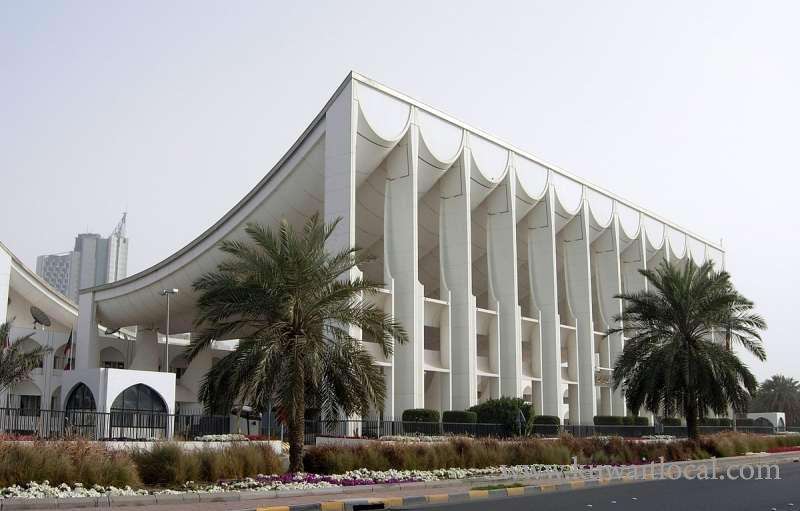Latest News
- From Tomorrow, Traffic Diversion On Third Ring Road
- Ministry Of Health Refute Rumors On Non-availability Of Antibiot...
- Amir Of Kuwait And Jordan King Renew Commitment To Regional Secu...
- 37 Arrested With Narcotics And Firearms
- Outrage Over Candidate's Arrest
- Six Stores Shut Down In Jahra For Selling Fake Goods
- Peddlers Caught With Drug Pills And Crystal Meth
- PAFN Shuts Down Restaurants And Bakeries Over Violations
- MoI Officer And Lawyer Jailed On Fraud Charges For Bad Cheques
- Thousands Of Bangladeshis Gathered To Pray For Rain
- Kuwait University Symposium Addresses Student Counselors' Role I...
- Kuwait Affirms The Importance Of Group Work In Addressing Common...
Vat Seen Finalized In Next Assembly Term

Reducing the number of expatriates in the country has become a public and governmental demand due to the lack of jobs for Kuwaitis, says Chairman of the parliamentary Job Replacement and Employment Crisis Committee MP Khalil Al-Saleh.
While pointing out that the number of expatriates has exceeded three million, Al-Saleh affirmed his support for the termination of unqualified expatriate workers who are considered a burden for the State, especially those working in governmental institutions. “At the same time, we do not support calls for the termination of all expatriate workers, especially those specialized in fields needed by the local labor market,” he added.
Al-Saleh pointed out that the meeting between Kuwait Chamber of Commerce and Industry (KCCI), Public Authority for Manpower (PAM) and some business owners needs further study. He also stressed the need to exclude expatriates with rare fields of specialization from the decision, adding that any decision concerning the labor market should be implemented.
Meanwhile, Chairman of the Budgets and Final Accounts Committee MP Adnan AbdulSamad said they discussed Monday a bill linking the budgets of ministries and government departments for fiscal 2018/2019. During the meeting, the representatives of Kuwait Petroleum Corporation (KPC) explained that after studying the fundamentals of the market, the risks and average price of oil in the region, they suggested that the price of oil in the new budget should be $50 per barrel.
AbdulSamad said although oil prices improved because of the commitment of countries to the agreement to reduce oil production, there are still fears of oil price decline. He added the concerned world agencies, international banks and consultants expect oil prices to fall in 2019; hence, the need to be careful in estimating oil prices in the new budget. He revealed the estimated revenues in the State budget for the new fiscal year reached KD 15 billion and KD 13 billion of which are oil revenues.
This is after deducting production costs estimated at KD 2.3 billion based on the technical study conducted by the Ministry of Finance. He said the estimated revenues from taxes and fees increased by 11 percent — KD 551 million — compared to the previous fiscal year due to the introduction of development contracts, such as the new airport and housing cities. He added the committee also inquired about the value added tax, including postponement of its implementation in the State of Kuwait until 2021; while the ministry sees the need to expedite procedures to impose selective tax on certain commodities like tobacco, energy drinks and soft drinks which are expected to increase State revenues by KD 200 million with positive effect on non-material aspects like public health.
In a related issue, Finance Minister Nayef Al-Hajraf said the government asked the Parliament to expedite ratification of the Gulf value added tax agreement. “Personally, I do not think there will be an opportunity to discuss the agreement within the current legislative term. We hope it will be finalized in the next legislative term,” he concluded.
Meanwhile, member of the Human Rights Committee MP Jaman Al- Harbash disclosed that they discussed the security restrictions on Bedouns with representatives of the Ministry of Interior and Central System for Remedying the Status of Illegal Residents (CSRSIR) on Monday. He added the Interior Ministry confirmed the formation of a committee to tackle these restrictions and give Bedouns the right to file complaints.
SOURCE : ARABTIMES
Trending News
-
 Kuwait Implements Home Biometrics Services Ahead O...
14 April 2024
Kuwait Implements Home Biometrics Services Ahead O...
14 April 2024 -
 Kuwait Airways Provides Update On Flight Schedule...
14 April 2024
Kuwait Airways Provides Update On Flight Schedule...
14 April 2024 -
 Kuwait Airways Introduces Convenient Home Luggage...
15 April 2024
Kuwait Airways Introduces Convenient Home Luggage...
15 April 2024 -
 Expat Residency Law Amended By Kuwait Ministerial...
20 April 2024
Expat Residency Law Amended By Kuwait Ministerial...
20 April 2024 -
 Gathering For Eid Al-Fitr Prayers: Kuwaiti Citizen...
10 April 2024
Gathering For Eid Al-Fitr Prayers: Kuwaiti Citizen...
10 April 2024 -
 Two Expats Are Arrested For Stealing From Salmiya...
17 April 2024
Two Expats Are Arrested For Stealing From Salmiya...
17 April 2024 -
 An Egyptian Expat Dies At Kuwait's Airport
11 April 2024
An Egyptian Expat Dies At Kuwait's Airport
11 April 2024 -
 Kuwait Airways Resumes Flights To Beirut And Oman...
15 April 2024
Kuwait Airways Resumes Flights To Beirut And Oman...
15 April 2024 -
 Bay Zero Water Park Kuwait: Summer Season Opens Ei...
11 April 2024
Bay Zero Water Park Kuwait: Summer Season Opens Ei...
11 April 2024 -
 Temperature Increases Cause Electricity Load Index...
21 April 2024
Temperature Increases Cause Electricity Load Index...
21 April 2024












Comments Post Comment